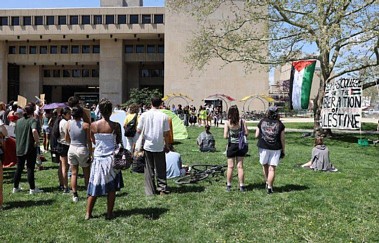Ted Gest and Trustees
RECENT UPDATES In the spring of 2024, Oberlin joined a nationwide wave of protests triggered by the situation in Gaza. More than 130 students gathered outside the Mudd library in Wilder Bowl on Monday, April 29, "to demand an end to Israel's occupation of Palestinian territories and the college's investment in Israel." That led to a large number of Message Forum comments on the Class of 1968's reunion website. According to Ted Gest, "The encampment at Wilder lasted for only about a day, but the Board of Trustees may consider divestment proposals at their meeting in June. See this new article in the Oberlin Review covering some of the latest developments."
On August 14, according to the Review, the Board of Trustees rejected April’s Student Initiated Proposal for Divestment on the grounds that “the endowment is not invested in individual companies but rather funds overseen by fund managers unaffiliated with the College, that these fund managers do not often consider ‘non-financial criteria,’ and that the hypothetical liquidation of the endowment’s investments would jeopardize Oberlin’s ability to provide financial aid and scholarships and pay faculty and staff. Beyond these financial reasons, the Board expressed that, by accepting the proposal, it ‘would be taking a clear institutional stand on one side of a fraught and contested issue that divides the Oberlin community.’”

"Regarding disinvestment," posted Edward McKelvey '68, "I repeat a point I made earlier in a different context.
"If your aim is to keep your hands clean in a financial sense and therefore to feel better, I'm all for it.
"If you think disinvestment will change the situation on the ground, I would be very skeptical, even if many colleges and universities were to band together in this fashion. Unless the fundamentals of the target companies change, other investors will gladly step in as the disinvestment temporarily reduces their stock prices and increases their yields."

Daniel Miller '68 said, "I don't think very many people are asking for divestment from Israel as a whole, although the way the Israeli populace is supporting the invasion of Gaza by blocking humanitarian aid may bring that into question. The aim since long before the invasion of Gaza was to block investment in Israeli corporations in the West Bank. ... For example, most of the Israeli exports of fruits and vegetables are produced by the illegal settlements, so those are boycotted, but dairy products come from dairies in Israel itself."

OLDER REPORTS Ted posted the following on the Class of 1968 website on January 25, 2023:
In mid-January, Board of Trustees chair Chris Canavan '84 and Vice Chair Lillie Johnson Edwards '75 spoke at an in-person meeting of the Oberlin Club of Washington, D.C. Because the program lasted only an hour and included discussion of about a half dozen major topics, there wasn't much time to go into detail. Judy Klavans and I may have been our only class members present. I'll give a brief summary here of what I heard:
* In general, the trustees said the college is in good financial and academic shape. Yield among admitted students is higher than expected, meaning that the dorms are crowded. This still is being debated but it's possible enrollment will go up in the coming years to 3,200 from 2,900.
* We are still able to attract good faculty members, but Edwards said we lose some minority candidates to other colleges because of stiff competition to hire them.
* On the staff level, Oberlin outsourced custodial and dining services on the ground that we had too many employees and they were being paid too much above average for the reason. Canavan denied that this was "union busting," as some alums have complained.
* Regarding Gibson's bakery, Canavan said it is a myth that the college did not try to settle the case and that when it was over, we tried to delay paying Gibson's. Canavan said we offered a high amount but the bakery refused to settle. The college was told it had a good case in court, but that obviously didn't prove to be true. The college still is talking to its insurers about how much they will pay. Canavan didn't divulge specifics.
* Some of you know that the trustees last fall changed the bylaws (and the historic Finney Compact) to clarify the administration's power vis-a-vis the faculty. Both trustees said there was a thorough discussion of all this with the faculty, which retains considerable power over the curriculum. One practical result is that the president may name the deans of the college and conservatory without being blocked by the faculty.
* Edwards described the “One Oberlin” plan as successful so far, removing the college's deficit while enhancing the curriculum. One program she praised is the Junior Practicum, described by the college as providing third-year students with a “unique and engaging opportunity to gain the skills and confidence to launch into a high-quality summer internship successfully.” Students who complete the program get up to $4,000.
* Both trustees agreed that there should be better communications from the trustees and the college administration with alumni about major developments on campus.
* One alum who has a son or daughter attending the college complained strongly about the inability of current facilities to handle the enrollment overload, citing students assigned to live in lounges and other crowding issues. The trustees were somewhat defensive about this, agreeing that dorms need to be improved but saying that major construction projects were delayed during the pandemic.
Overall, the trustees gave an upbeat and optimistic account of what was is happening at the college. As a member of the Alumni Leadership Council, I'm glad to provide more info or point you places where you can get it.


